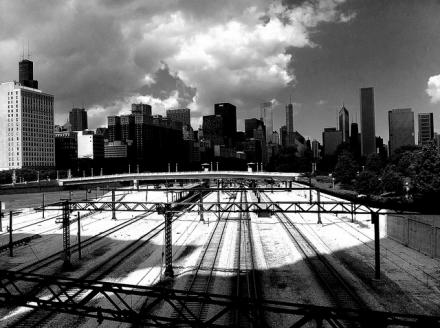
We sometimes describe Henry George’s fiscal proposal as a “smart tax,” unlike the inefficient anti-prosperity taxes that fund most government programs today. Similarly, there can be “smart” transit facilities, which are distinguished from dumb ones because they are cost less and provide more service. Perhaps the most prominent recent smart transit proposal is the CTA Gray Line, whose creator, Mike Payne, will be our speaker tonight.
From the CTA Gray Line web page:
Launching the Gray Line would provide a brand new CTA Rapid Transit (‘L’) service (on EXISTING facilities) to Grant Park, the Museum Campus, the newly renovated Soldier Field, and McCormick Place (with a connected station under the McCormick Place South Bldg.)
Also service to Bronzeville, Hyde Park, the Museum of Science & Industry (with an ADA compliant station 1 1/2 blocks away), the University of Chicago, Woodlawn, South Shore, South Chicago, Chatham, Chicago State University, Pullman, Roseland, Blue Island, and Hegewisch; again almost all Gray Line facilities are in place, and operating RIGHT NOW TODAY.
. . .
There is N O need for costly and time consuming design and engineering, right-of-way acquistion, condemnation, demolition, clearing, materials acquisition, delivery, and major construction; the CTA Gray Line ‘L’ System could be up and providing CTA ‘L’ service to the Far South Side WITHIN O N E YEAR, rather than waiting until 2016 for completion of the Red Line Extension.
Come to this free presentation to meet and question a prominent transit activist, and think about what could be done with all the public money saved by smart projects like the CTA Gray Line.
In recent years, Georgists have created a large amount of video material about fundamental economic concepts, their basis and their application. Some are brief, some extended. All are helpful in understanding what we teach, why it’s important, and how it can be used. Producers include Earthsharing, Earthsharing Australia, Council of Georgist Organizations, and others. We’ll be watching a bunch of these during a four hour period Tuesday evening. Feel free to drop by for as long (or short) as you’d like. A list of the videos, with links, will be provided, as will some light refreshments.
The event is free, altho donations to help pay our rent and other expenses are appreciated.
Between 1948 and 1973, Americans’ real wages rose almost as fast as their productivity. After 1973, productivity grew 147% but wages rose only 19%. This raises two questions:
(1) If workers getting less, who is getting more?
(2) Is there a way to restore the balance?
To solve the problem of poverty, and the many other problems that follow from it, ordinary workers need higher wages. George Menninger describes how to raise wages without interfering in the free market and without taking anyone’s earnings.
George Menninger is an instructor at the Henry George School of Chicago, and attendees at this free program will have the opportunity to sign up for his Progress & Poverty course.
You can sign up for this free event thru Eventbrite, or RSVP directly by email.
Between 1948 and 1973, Americans’ real wages rose almost as fast as their productivity. After 1973, productivity grew 147% but wages rose only 19%. This raises two questions:
(1) If workers getting less, who is getting more?
(2) Is there a way to restore the balance?
To solve the problem of poverty, and the many other problems that follow from it, ordinary workers need higher wages. George Menninger describes how to raise wages without interfering in the free market and without taking anyone’s earnings.
George Menninger is an instructor at the Henry George School of Chicago, and attendees at this free program will have the opportunity to sign up for his Progress & Poverty course.
No reservation is required, but you can let us know by email that you’re coming.
Between 1948 and 1973, Americans’ real wages rose almost as fast as their productivity. After 1973, productivity grew 147% but wages rose only 19%. This raises two questions:
(1) If workers getting less, who is getting more?
(2) Is there a way to restore the balance?
To solve the problem of poverty, and the many other problems that follow from it, ordinary workers need higher wages. George Menninger describes how to raise wages without interfering in the free market and without taking anyone’s earnings.
George Menninger is an instructor at the Henry George School of Chicago, and attendees at this free program will have the opportunity to sign up for his Progress & Poverty course.
No reservation is required, but you can let us know by email that you’re coming.
